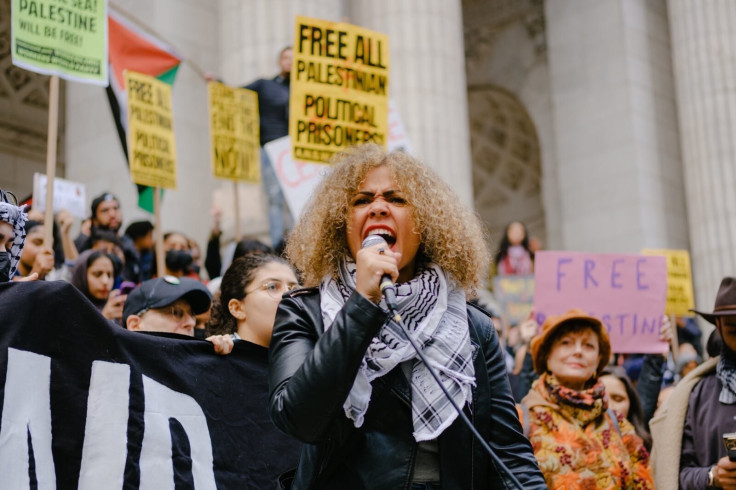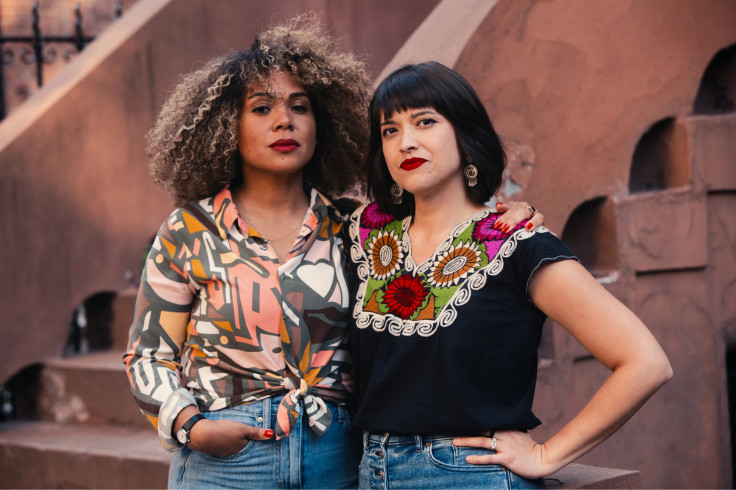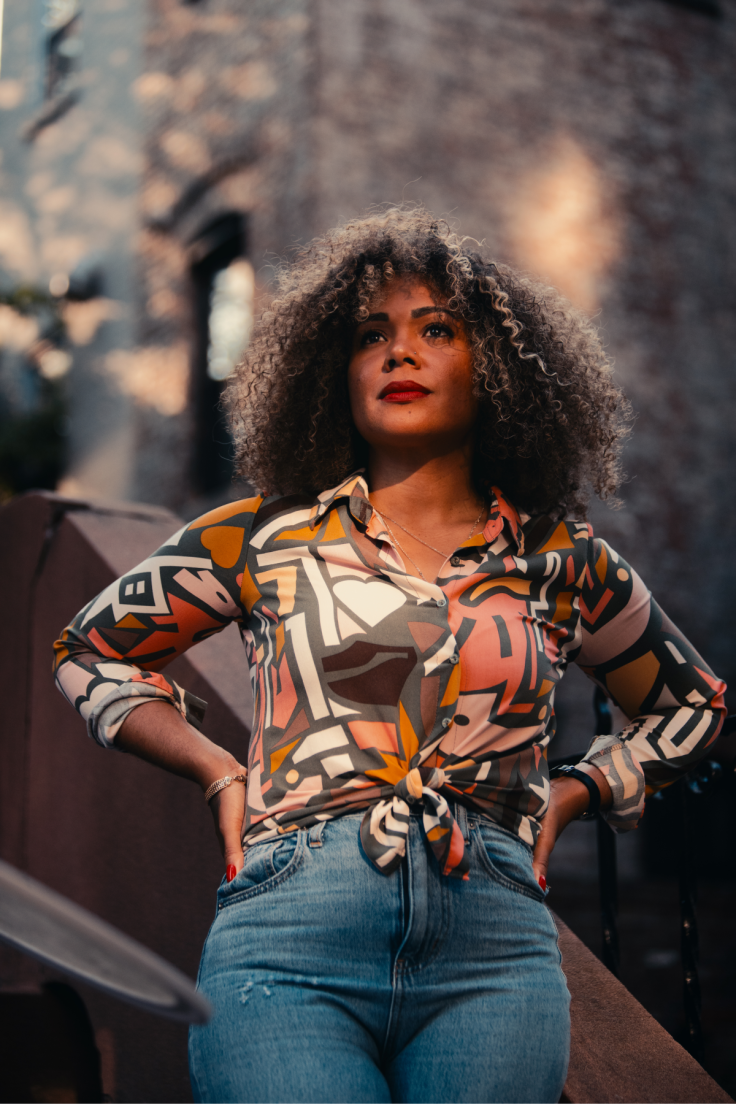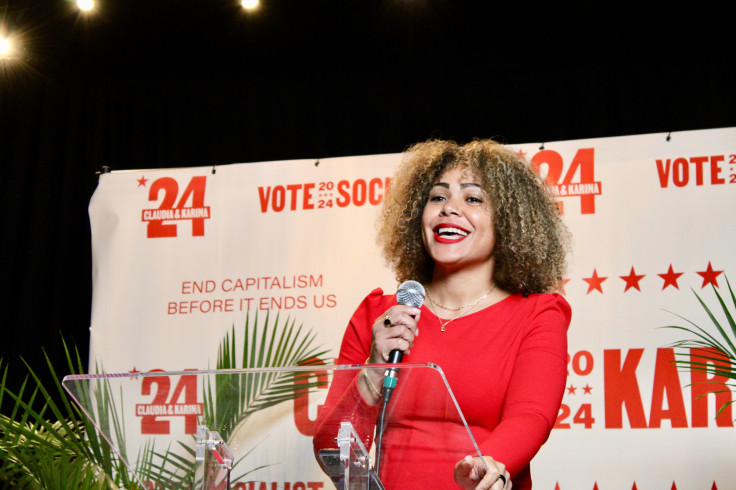This article is part of The Latin Times' Latinas 2024, a thematic week focused on Latina's impact on the U.S. economy, culture, and politics. Although Latinas comprise more than 30 million people in the U.S., according to the Pew Research Center, they still face major day-to-day challenges, including underrepresentation, the gender pay gap, labor discrimination, and sexual harassment. Discover our articles and interviews exploring the complexities of being Latina in the U.S. today.

Far-left political movements have historically not been compatible with mainstream politics in the United States. Now, a Latina woman is trying to change that.
Claudia De la Cruz is a mother, popular educator, community organizer and theologian. And for 2024, she wants to add another title to her multi-hyphenate persona— President of the United States.
Born in the South Bronx to immigrant parents from the Dominican Republic, she was nourished by the Black and Caribbean working class communities of the Bronx and Washington Heights in New York City in the 1980s and 90s. Since an early age, she has been exposed to conditions of poverty, violence and oppression. As she grew older, De la Cruz vowed to change that.
From the Puerto Rican independence movement, to the Palestinian struggle and the grassroots organizing of the Venezuelan Bolivarian Circles, De La Cruz seeks to fortify international solidarity and political organization inside the U.S.
As a candidate for the Party for Socialism and Liberation she seeks, among other things, to "end capitalism before it ends us," cut military budgets by 90%, defend women's rights and end mass incarcerations, particularly that of people of color.

Barring a miracle, De la Cruz and her running mate, Karina Garcia, will not be able to win the presidential election. Her party, which sees a socialist U.S. as part of a step towards the creation of a communist world, won about 85,000 votes in the 2020 presidential election. But nevertheless, De la Cruz is optimistic about this time in American politics.
She recently sat down with The Latin Times to discuss her ideas and the current landscape of women in the U.S. This interview has been edited for length and clarity.
What does it mean to be a Latina in the US today?
To be a Latina in the United States today means to be engaged in the transformation of society. It means taking up space boldly and courageously to make the changes necessary to be able to have the best quality of life in our communities. We are a rising majority in this country, and deserve all the civil and human rights that are so urgent for us. The right to access health care, the right to housing, the right to be able to have free education, and everything that guarantees that the next generation of Latinos and Latinas in, in this country are able to live dignified lives.
What would you say is the main issue facing Latinas today?
I think it's important to make a distinction. There are Latinos and Latinas that are part of a ruling class, that are part of the Senate, that are part of Congress, etc. I think we have, to a certain extent, reached a certain level of representation. Maybe not to the amount that folks have historically fought for, but there is a level of representation of Latinos and Latinas in, in positions of power.
And so when you speak about what is the biggest challenge that Latinos and Latinas face, they are very much the same issues in mass that working class people face. So lack of access to health care is one. The rolling back of rights for women to access reproductive rights is one that affects Latinas. When we're talking about employment, knowing that Latinas earn $0.55 to every dollar that a white man earns. To know that even though we have increasing rates of women, Latinas who access higher education, but at the same time we are amongst the most burdened by student debt is a problem.
So what I'm getting at is that there is a distinction between the Latinas that are in cahoots, or are part of the ruling class, and the Latinas who are the majority of us who struggle every day to make ends meet. And our struggles are not distinct from the majority of people in this country, because we are part of a poor and working class majority of this country. And we struggle with the many factors that the majority of working class people struggle with in this country. There are added elements to it. There's an element of your immigrant status, for example. Immigrant women who are undocumented have further less access to the most basic civil and human rights in this country, and are exploited at a higher rate than many people who are exploited. And yet we are part of those who struggle for dignity, for dignity in this country. We face all of these struggles, you know, holistically, not in fragments. And all these different things, I think are connected to the root of what the problem is in this country, which is a capitalist system that doesn't allow for working class people to live, and those who have been historically marginalized, including Latinas, are in the worst position.

Having been born in the Bronx, and growing up in Washington Heights and the Dominican Republic, how do you think these spaces helped shape your socialist values and views?
I lived for a short period of time in the Dominican Republic, and that helped me shape an understanding of what U.S. imperialism and interventions do to countries like the Dominican Republic. For example, the Dominican Republic has been intervened by the United States since the early 1900s, through military operations, but also economically and politically.
That definitely shaped my understanding of what and how the U.S. relates to the rest of the world, specifically the rest of the American continent. In a way that it treats the rest of the American continent as its backyard. It gave me a sense of my working class roots. I was able to understand where my grandmother and grandparents in general were coming from. The type of work that they did. When I came back to the United States, I went back to live in the Bronx, where I was born, and I saw levels of inequality and poverty that were not very different from the levels of inequality and poverty in the Dominican Republic. There was a little bit more buying power, But it didn't necessarily mean that poverty wasn't there. And so the levels of consciousness deepened in my experience living in the Dominican Republic and the United States.
My mom was an educator in the New York City Department of Education for over 30 years. My dad was a construction worker, he held multiple jobs, and a lot of the people in my community held multiple jobs. So it couldn't be that the people that were in my community were the deficient ones. Like, it's not possible that people work so hard and yet have so much trouble to make ends meet. It's impossible. And so I started asking questions around the economy, like, why is it that people cannot live lives that are fulfilled, that they could do what they need and want to do, but they have to struggle every day. Why is it that there are jobs that are gendered? Why is it that women are subjected to do certain tasks while men are okay doing others?
So I started raising those questions, and it wasn't until my mom decided that she would take me into church that I was able to find these answers.That church happened to practice faith from a perspective of liberation theology. There were socialists looking for communities in the United States, specifically in the Harlem, Washington Heights, Bronx communities. And they came together, they were organizers, educators. They belonged to social movements. And these were the folks that introduced me to socialism as a form of answering a lot of the questions and concerns that I had, but also introducing me to organizing and movement building.

What do you think is the importance of having some sort of socialist agenda in Washington, especially for women today?
I think it would be highly beneficial. I mean, a lot of what happens as a result of capitalism is the profiting from the exploitation and the oppression of the many, including women. If we think about patriarchy, patriarchy operates precisely because of capitalism, because it's important to be able to create a certain level of gender division, to have even those who are oppressed (which are working class men) have someone else to oppress. And so when we're thinking about the White House and the Senate, and we need to reimagine all of it to be able to do anything that actually matters, like within capitalism, there is no reform that we will be able to see as an actual sustainable solution to the problems we face. They could give you some sort of relief or a moment, but they will take that back from you the moment that they can and the moment that it serves them.
The very structure of a socialist society prioritizes human and civil rights, which means that women wouldn't be under the threat of having child care centers closed by the thousands. We experienced that in September in the United States, the wealthiest country in the world shut down 70,000 childcare centers. We experienced the rolling back of some sort of support that families received with the child tax credit that provided some sort of relief to families, primarily mothers. And that was taken away by the capitalists as soon as they understood it was needed for them. What did that do? That increased the levels of child poverty, for us. And so when we're talking about socialism, we're talking about the reorganization of society to prioritize those aspects of our lives that we are not willing to gamble with.
We often talk about the double-gender bias in politics that holds women to different standards than that of men. Have you ever felt this sort of bias against you or any sort of other female colleagues?
Discrimination happens across the board and it happens in all spaces. The bias that is attached to one's gender, or one's sexual orientation for that matter, is a result of a system that dehumanizes those who don't look the part, those who are not wealthy, who are not white, who are not men. I think that I have engaged in a struggle. Struggle that is anti-white supremacy and a struggle that is anti-patriarchal. Career politicians and women experience discrimination, oppression, all these different things and bias of prejudice of all sorts. And yet they're defending a project. And when it comes to defending that project, they will close ranks in defense of that project.
In the spaces of movement building, in the spaces of organizing, in the spaces of making politics your everyday life, you struggle with people. I have been affirmed in struggle and in movement of the fact that my voice matters. There's a level of encouragement that happens in certain spaces. I was encouraged to create. In terms of politics, a lot of the folks that I was engaged with and was under the mentorship of, were older men, and they did their best to be able to say "those spaces that you don't have, you need to create." And when I was 24, I created a young women's leadership development project that lasted 14 years in the Washington Heights area. And we did organizing work, and it reached thousands of young women. But it wasn't a space that I came out of because I wasn't mentored in a lot of ways by many groups of women. I was cared for in my family by women, and I came into a space of politics and organizing that was mostly dominated by a lot of men. But they were able to say, you need to create the spaces that are necessary. And so I was encouraged to do so, which is not what happens in institutions and, and political spaces that are not that are not ours.
What is your hope for the US, especially regarding women in the US and Latina women in the US as we head into the November elections?
My hope has always been in the people. My faith has always been in the people's ability to create their own future and not depend on our class enemies, on people who don't care about us, be them Republicans, Democrats, be them the owners and CEOs of Amazon or ExxonMobil or any of these corporations that ultimately benefit from our exploitation. My hope is that people can come together in principled unity, that they can overcome historical lines of division that have been imposed and created by the ruling class to keep us separated. That instead of having, you know, immigrant rights be a thing here and, you know, the abolition of prisons and policing here and all these different fragmented parts of society and struggles, we build the unity of working class people, building the unity of people to be able to have political power and not political power. Until we're able to have a force against the force of the ruling class, we won't be able to win. I have my hopes and my bets and my faith that people in this country will wake up to the reality that the system that we currently have does not work, and it won't work for generations to come.
© 2025 Latin Times. All rights reserved. Do not reproduce without permission.





